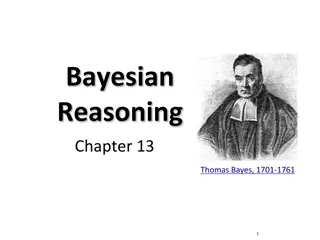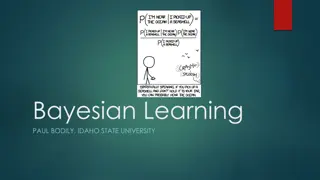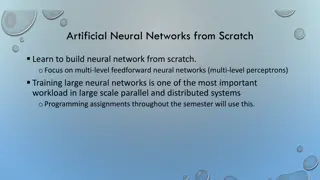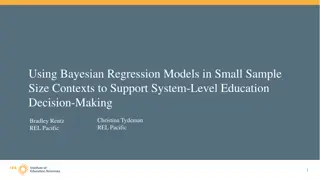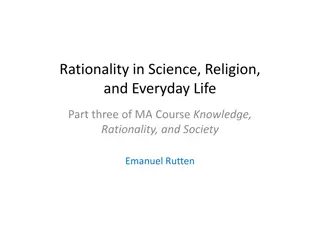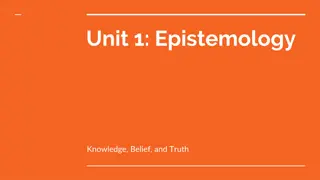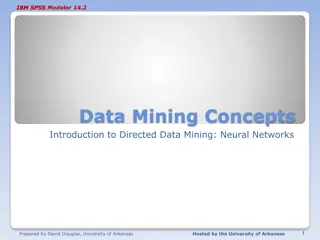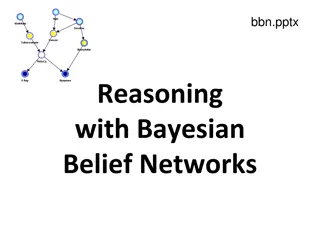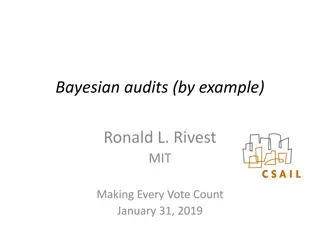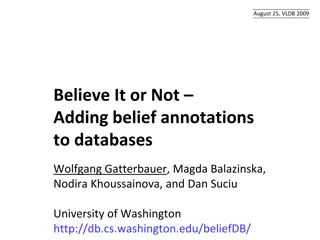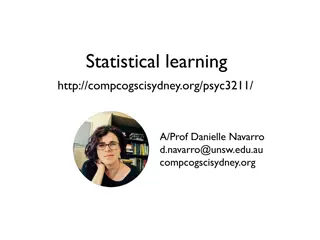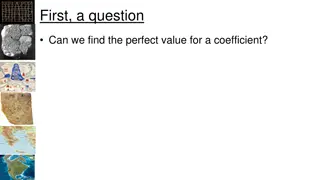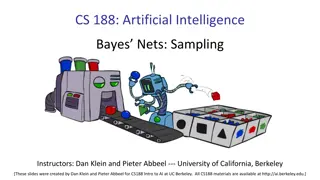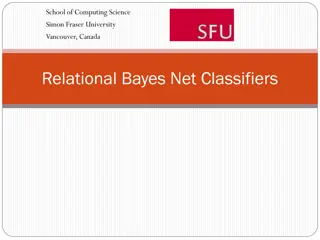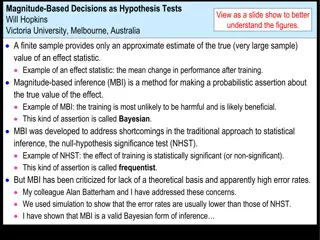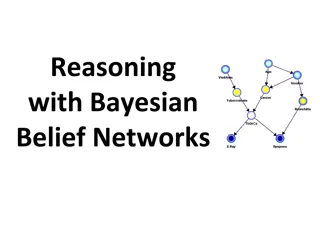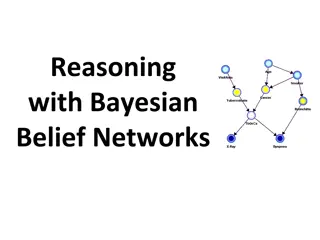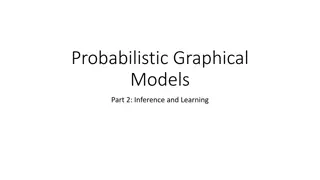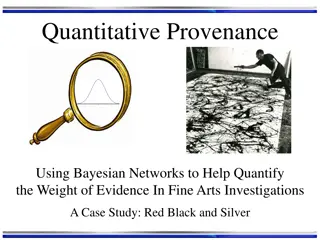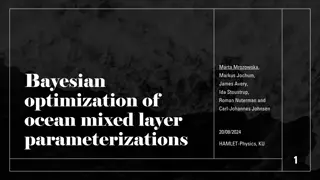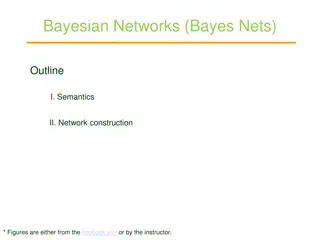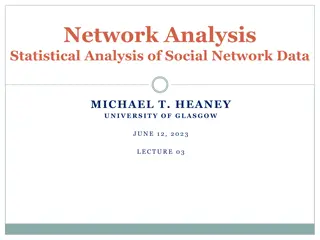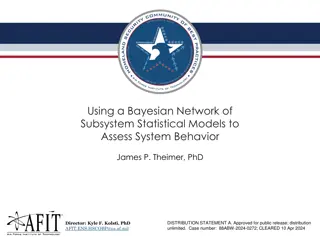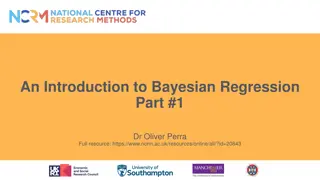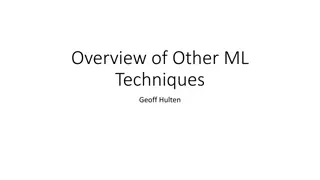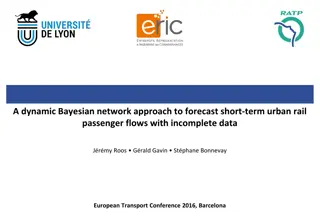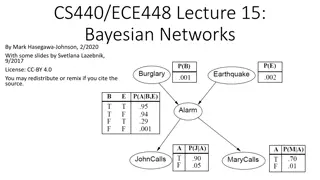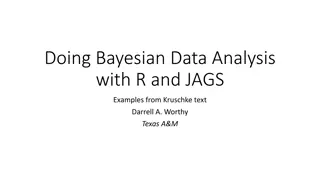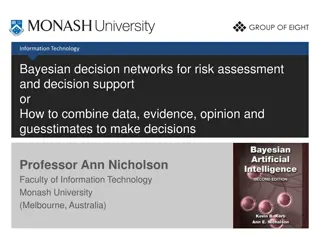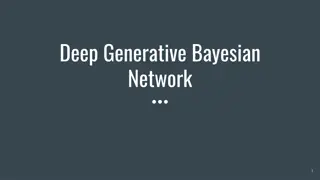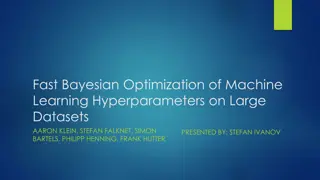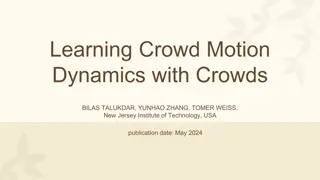Understanding Bayesian Reasoning and Decision Making with Uncertainty
Exploring Bayesian reasoning principles such as Bayesian inference and Naïve Bayes algorithm in the context of uncertainty. The content covers the sources of uncertainty, decision-making strategies, and practical examples like predicting alarm events based on probabilities.
0 views • 32 slides
Understanding Bayesian Learning in Machine Learning
Bayesian learning is a powerful approach in machine learning that involves combining data likelihood with prior knowledge to make decisions. It includes Bayesian classification, where the posterior probability of an output class given input data is calculated using Bayes Rule. Understanding Bayesian
0 views • 17 slides
Exploring Belief Systems and Models of the Universe
Delve into the intricacies of belief systems, levels of consciousness, and various models of the universe. Discover how different perspectives shape our understanding of spirituality, philosophy, and science. Reflect on the usefulness of your belief system and its impact on guiding your life and int
0 views • 33 slides
Understanding Artificial Neural Networks From Scratch
Learn how to build artificial neural networks from scratch, focusing on multi-level feedforward networks like multi-level perceptrons. Discover how neural networks function, including training large networks in parallel and distributed systems, and grasp concepts such as learning non-linear function
1 views • 33 slides
Utilizing Bayesian Regression Models for Small Sample Education Decision-Making
Bayesian regression models can be valuable tools for addressing the challenges of small sample sizes in educational research, particularly in the Pacific Region where data availability is limited. These models offer advantages for conducting robust analyses and informing system-level education decis
2 views • 25 slides
Rationality in Science, Religion, and Everyday Life: Exploring Belief Formation and Rational Decision-Making
Explore the essence of rational belief formation across science, religion, and daily life through the lens of cognitive processes, decision-making, and value systems. Delve into the conditions for rational belief, practical decision-making, and axiological rationality to understand human cognition a
1 views • 142 slides
Exploring Epistemology: Knowledge, Belief, and Truth
Delve into the intriguing world of epistemology through a thought-provoking story of a mouse and cheese. Questions of knowledge, belief, truth, and reasoning are examined, challenging perceptions and understanding. Discover perspectives from various characters in the narrative and ponder the distinc
0 views • 17 slides
Bayesian Approach in Pediatric Cancer Clinical Trials
Pediatric cancer clinical trials benefit from Bayesian analysis, allowing for the incorporation of uncertainty in prior knowledge and ensuring more informed decision-making. The use of Bayesian methods in the development of cancer drugs for children and adolescents, as emphasized by initiatives like
0 views • 26 slides
Introduction to Neural Networks in IBM SPSS Modeler 14.2
This presentation provides an introduction to neural networks in IBM SPSS Modeler 14.2. It covers the concepts of directed data mining using neural networks, the structure of neural networks, terms associated with neural networks, and the process of inputs and outputs in neural network models. The d
0 views • 18 slides
Reasoning with Bayesian Belief Networks
Bayesian Belief Networks (BBNs) provide a powerful framework for reasoning with probabilistic relationships between variables. Introduced by Judea Pearl in the 1980s, BBNs encode causal associations and are used in various AI applications such as diagnosis, expert systems, planning, and learning. Th
0 views • 49 slides
Understanding Bayesian Reasoning: A Comprehensive Overview
Bayesian reasoning involves utilizing probabilities to make inferences and decisions in the face of uncertainty. This approach allows for causal reasoning, decision-making under uncertainty, and prediction based on available evidence. The concept of Bayesian Belief Networks is explored, along with t
1 views • 33 slides
Understanding Bayesian Audits in Election Processes
Bayesian audits, introduced by Ronald L. Rivest, offer a method to validate election results by sampling and analyzing paper ballots. They address the probability of incorrect winners being accepted and the upset probability of reported winners losing if all ballots were examined. The Bayesian metho
2 views • 7 slides
Managing Belief Annotations in Databases: A Modal Logic Approach
Explore the concept of belief databases that enable data curation based on modal and default logic in a relational model. The work discusses managing inconsistent views in community databases and presents a motivating application scenario to illustrate the challenges and solutions in handling belief
0 views • 34 slides
Understanding Islam: Big Ideas for KS4 Curriculum on Islamic Practices
Explore the key concepts of Islam such as Shahadah, salat, and sawm within the context of belief and action. Delve into the significance of these practices in Muslim belief and debate whether Islam is primarily about belief or action. Engage in thought-provoking discussions on the importance of Shah
0 views • 4 slides
Exploring Statistical Learning and Bayesian Reasoning in Cognitive Science
Delve into the fascinating realms of statistical learning and Bayesian reasoning in the context of cognitive science. Uncover the intricacies of neural networks, one-shot generalization puzzles, and the fusion of Bayesian cognitive models with machine learning. Discover how these concepts shed light
0 views • 58 slides
Understanding Bayesian Methods for Probability Estimation
Bayesian methods facilitate updating probabilities based on new information, allowing integration of diverse data types. Bayes' Theorem forms the basis, with examples like landslide prediction illustrating its application. Prior and posterior probabilities, likelihood, and Bayesian modeling concepts
0 views • 13 slides
Understanding Sampling in Artificial Intelligence: An Overview
Exploring the concept of sampling in artificial intelligence, particularly in the context of Bayesian networks. Sampling involves obtaining samples from unknown distributions for various purposes like learning, inference, and prediction. Different sampling methods and their application in Bayesian n
2 views • 29 slides
Understanding Relational Bayesian Networks in Statistical Inference
Relational Bayesian networks play a crucial role in predicting ground facts and frequencies in complex relational data. Through first-order and ground probabilities, these networks provide insights into individual cases and categories. Learning Bayesian networks for such data involves exploring diff
0 views • 46 slides
Collaborative Bayesian Filtering in Online Recommendation Systems
COBAFI: COLLABORATIVE BAYESIAN FILTERING is a model developed by Alex Beutel and collaborators to predict user preferences in online recommendation systems. The model aims to fit user ratings data, understand user behavior, and detect spam. It utilizes Bayesian probabilistic matrix factorization and
0 views • 49 slides
Understanding Magnitude-Based Decisions in Hypothesis Testing
Magnitude-based decisions (MBD) offer a probabilistic way to assess the true effects of experiments, addressing limitations of traditional null-hypothesis significance testing (NHST). By incorporating Bayesian principles and acknowledging uncertainties, MBD provides a robust framework for drawing co
1 views • 22 slides
Understanding Bayesian Belief Networks for AI Problem Solving
Bayesian Belief Networks (BBNs) are graphical models that help in reasoning with probabilistic relationships among random variables. They are useful for solving various AI problems such as diagnosis, expert systems, planning, and learning. By using the Bayes Rule, which allows computing the probabil
0 views • 43 slides
Understanding Bayesian Belief Networks for AI Applications
Bayesian Belief Networks (BBNs) provide a powerful framework for reasoning with probabilistic relationships among variables, offering applications in AI such as diagnosis, expert systems, planning, and learning. This technology involves nodes representing variables and links showing influences, allo
0 views • 47 slides
Probabilistic Graphical Models Part 2: Inference and Learning
This segment delves into various types of inferences in probabilistic graphical models, including marginal inference, posterior inference, and maximum a posteriori inference. It also covers methods like variable elimination, belief propagation, and junction tree for exact inference, along with appro
0 views • 33 slides
Understanding Bayesian Networks in Fine Arts Investigations
Explore the application of Bayesian Networks in quantifying evidence weight in fine arts investigations. Delve into probability theory, Bayes theorem, decision theory, and their implementation. Discover how Bayesian statistics provide a framework for comparing theories and updating probabilities bas
0 views • 26 slides
Bayesian Optimization in Ocean Modeling
Utilizing Bayesian optimization in ocean modeling, this research explores optimizing mixed layer parameterizations and turbulent kinetic energy closure schemes. It addresses challenges like expensive evaluations of objective functions and the uncertainty of vertical mixing, presenting a solution thr
0 views • 35 slides
Understanding Bayesian Networks: A Comprehensive Overview
Bayesian networks, also known as Bayes nets, provide a powerful tool for modeling uncertainty in complex domains by representing conditional independence relationships among variables. This outline covers the semantics, construction, and application of Bayesian networks, illustrating how they offer
0 views • 17 slides
Understanding Network Analysis: Whole Networks vs. Ego Networks
Explore the differences between Whole Networks and Ego Networks in social network analysis. Whole Networks provide comprehensive information about all nodes and links, enabling the computation of network-level statistics. On the other hand, Ego Networks focus on a sample of nodes, limiting the abili
0 views • 31 slides
Using Bayesian Networks to Assess System Behavior
Bayesian networks offer a solution for assessing system behavior when testing the total system is not feasible. By modeling subsystems and computing subjective probabilities, decision makers can trust their knowledge even when only parts of the system are tested. This approach provides a way to quan
0 views • 18 slides
Understanding Bayesian Regression and Its Advantages
Bayesian regression offers a unique approach to hypothesis testing by incorporating prior knowledge and updating beliefs with new evidence. Contrasting with frequentist methods, Bayesian analysis considers parameters as uncertain and describes them using probability distributions. This methodology a
0 views • 12 slides
Understanding Bayesian Networks in Machine Learning
Bayesian Networks are probabilistic graphical models that represent relationships between variables. They are used for modeling uncertain knowledge and performing inference. This content covers topics such as conditional independence, representation of dependencies, inference techniques, and learnin
0 views • 14 slides
Bayesian Analysis of Oxygen Consumption Rates in Athletes
The sports scientist measures the rate of oxygen consumption in athletes after exercise, with a sample mean of 2.25 litres per minute and a standard deviation of 1.6. Using Bayesian analysis with vague prior knowledge, a posterior distribution is obtained. The 95% Bayesian confidence interval is cal
0 views • 6 slides
Efficient and Effective Duplicate Detection in Hierarchical Data
This study explores the efficient and effective detection of duplicates in hierarchical data, focusing on fuzzy duplicates and hierarchical relationships in XML. It discusses the current and proposed systems, including the use of Bayesian networks for similarity computations. The methods involve vec
0 views • 25 slides
Forecasting Short-Term Urban Rail Passenger Flows Using Dynamic Bayesian Networks
A study presented a dynamic Bayesian network approach to forecast short-term urban rail passenger flows in the Paris region. The research addresses the challenges of incomplete data, unexpected events, and the need for real-time forecasting in public transport networks. By leveraging Bayesian networ
0 views • 19 slides
Understanding Bayesian Networks for Efficient Probabilistic Inference
Bayesian networks, also known as graphical models, provide a compact and efficient way to represent complex joint probability distributions involving hidden variables. By depicting conditional independence relationships between random variables in a graph, Bayesian networks facilitate Bayesian infer
0 views • 33 slides
Exploring Bayesian Data Analysis with R and JAGS
Delve into the world of Bayesian data analysis using R and JAGS with examples from the text by Kruschke. Learn how to set up the required tools, perform regression analyses, and understand multiple regression concepts using real-world datasets. Enhance your statistical skills and make informed decis
0 views • 20 slides
Bayesian Decision Networks in Information Technology for Decision Support
Explore the application of Bayesian decision networks in Information Technology, emphasizing risk assessment and decision support. Understand how to amalgamate data, evidence, opinion, and guesstimates to make informed decisions. Delve into probabilistic graphical models capturing process structures
0 views • 57 slides
Utilizing Bayesian Hierarchical Model for Clinical Trial Quality Design
Explore how a Bayesian Hierarchical Model can be leveraged to design quality into clinical trials and ensure compliance with ICH E6 R2 Quality Tolerance Limits. Learn about the Risk-Based approach, Quality Tolerance Limits methodology, and the application of Bayesian modeling for early phase studies
0 views • 14 slides
Understanding Deep Generative Bayesian Networks in Machine Learning
Exploring the differences between Neural Networks and Bayesian Neural Networks, the advantages of the latter including robustness and adaptation capabilities, the Bayesian theory behind these networks, and insights into the comparison with regular neural network theory. Dive into the complexities, u
0 views • 22 slides
Fast Bayesian Optimization for Machine Learning Hyperparameters on Large Datasets
Fast Bayesian Optimization optimizes hyperparameters for machine learning on large datasets efficiently. It involves black-box optimization using Gaussian Processes and acquisition functions. Regular Bayesian Optimization faces challenges with large datasets, but FABOLAS introduces an innovative app
0 views • 12 slides
Dynamic Crowd Simulation Using Deep Reinforcement Learning and Bayesian Inference
This paper introduces a novel method for simulating crowd movements by combining deep reinforcement learning (DRL) with Bayesian inference. By leveraging neural networks to capture complex crowd behaviors, the proposed approach incorporates rewards for natural movements and a position-based dynamics
0 views • 15 slides
